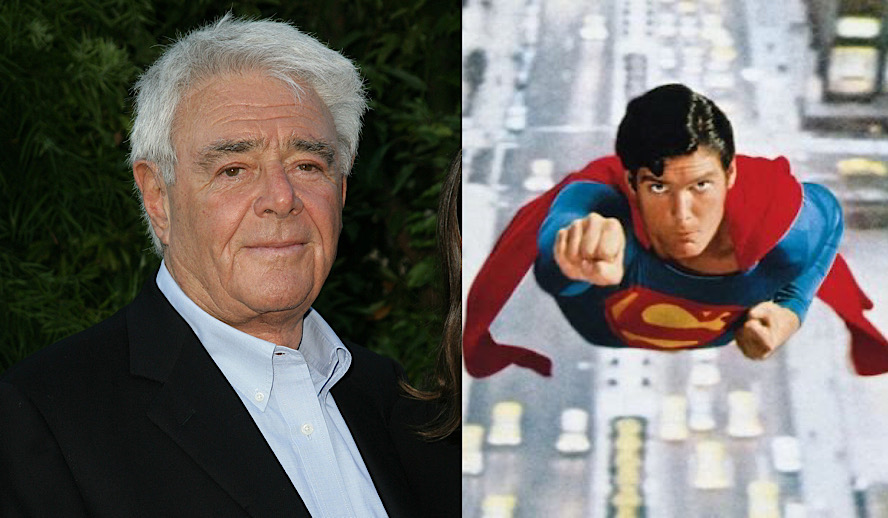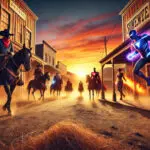Table of Contents

Video Version of this Article
Photo/Video: Richard Donner at The 36th Annual Saturn Awards/S Bukley/Shutterstock/Hollywood Insider YouTube Channel
The basic premise of ‘Shadow in the Cloud’, the first new release of 2021, is that a World War II bomber is sabotaged by a gremlin. Maude Garrett (Chloë Grace Moretz) witnesses the creature tampering with the plane, but nobody else believes her. If this sounds familiar, it’s because it’s inspired by one of the most famous ‘Twilight Zone’ episodes, ‘Nightmare at 20,000 Feet’, starring William Shatner and directed by Richard Donner.
Related article: The Complete List of 2021 Oscar Nominations – Celebrations, Surprises & Snubs | The Show Must Go On
Related article: A Tribute to Stan Lee: The Man Who Invented The Great American Pantheon – Superheroes!
At 90 years old, the very same Richard Donner recently announced that he will return to direct the fifth and final entry of his iconic ‘Lethal Weapon’ movie franchise, which will double as a swan song to conclude his decades-long career. It’s remarkably in character for the man who exemplified success as a working director within the studio system, not to undermine the tremendous impacts on Hollywood that he would personally be responsible for–without Donner, the Marvel Cinematic Universe might not be what it is today.
In anticipation of ‘Lethal Weapon 5’, which is slated to reunite Donner with co-stars Mel Gibson and Danny Glover, I want to go back and look at some of the seminal moments of Donner’s career.
The Working TV Director
Born in the Bronx, Donner’s first exposure to the TV industry was as an aspiring actor–he played a bit part in a show directed by Martin Ritt, who suggested he become a director and hired him as an assistant. He was later hired by Desilu (the production company founded by Lucille Ball and Desi Arnaz) to direct commercials, and ended up working prolifically throughout the ‘60s directing both action-oriented shows like ‘The Fugitive’ and ‘The Man from U.N.C.L.E.’, as well as comedies like ‘Get Smart’ and ‘Gilligan’s Island’. It was during this time that he directed the aforementioned episode of ‘The Twilight Zone.’
Subscribe to Hollywood Insider’s YouTube Channel, by clicking here.
Donner would occasionally be sought out to direct feature films that performed reasonably well, but nothing more–Donner himself would later state that he “wasn’t ready” at the time, and had no qualms about continuing to work as a television director, where he continued to hone his craft.
It’s worth mentioning that his first feature, ‘X-15’, a film about the problems besetting NASA’s X-15 research rocket program, is still interesting to watch in part because Donner himself was a pilot. His understanding of flight and aerodynamics would not only be put on display with ‘X-15’, but also play an important role in a film he would later direct that required the audience to really believe a man could fly–’Superman’.
In the meantime, he continued to work in television and occasionally film, an experience which he’s said taught him how to be “good with meeting a schedule and a budget.” He developed a mentality that he had an obligation to deliver, rather than be indulged. He also nurtured a philosophy of verisimilitude, which to Donner meant focusing on the truthfulness and reality of a scene, as well as being faithful to the source material.
Through a series of serendipitous circumstances, he would come to direct ‘The Omen’ in 1976, a mega-hit that marked a turning point in Donner’s career and the beginning of his tenure as a Hollywood director.
Related article: The Power of Positivity: Ikorodu Bois + Chris Hemsworth + Russo Brothers + Sam Hargrave
Limited Time Offer – FREE Subscription to Hollywood Insider
‘Superman’
‘Superman’ had already been in the works for years by the time its producers hired Donner to direct. Its script, written originally by Mario Puzo, had been reworked by a number of different writers and resembled previous, campier superhero incarnations like the 1960s ‘Batman’ TV series. Donner also recalled that when he was brought on, they’d planned to utilize the same effects to make Superman fly as they did on the ‘50s TV show ‘Adventures of Superman’, starring George Reeves.
At the time, superheroes on-screen were purely figures of camp. Nobody expected to take ‘Superman’ seriously, and that’s why it was revolutionary when Donner insisted that the story be played straight. Although the film certainly maintains a relatively light-hearted tone with definite comedic elements, its story is told with emotional gravity and honesty. To aid in this, Donner enlisted Tom Mankiewicz, nephew of ‘Citizen Kane’ writer Herman Mankiewicz, to rewrite the script one last time. Writers Guild of America rules are the reason that Mario Puzo is still credited as the writer of ‘Superman’, but according to Mankiewicz, “not a word from the Puzo script was used.”
Donner also insisted that in order for the film to work, people had to really believe Superman could fly. It’s antiquated to modern eyes, but the groundbreaking nature of ‘Superman’s’ visual effects speaks for itself–just look at the movie’s tagline, “You’ll believe a man can fly.” Apparently, Christopher Reeve was an experienced glider pilot which lent to his ability to hold himself aerodynamically, furthering the illusion of flight.
Related article: Hollywood Insider’s CEO Pritan Ambroase: “The Importance of Venice Film Festival as the Protector of Cinema”
Related article: The Masters of Cinema Archives: Hollywood Insider Pays Tribute to ‘La Vie En Rose’, Exclusive Interview with Director Olivier Dahan
Richard Donner – A Living Legend
‘Superman’ was the very first modern superhero film, and without it, we wouldn’t have had the progression of comic book cinema that’s culminated in the MCU, the biggest film franchise in history. In addition, aside from inventing the superhero film as we know it today, both Marvel Studios president Kevin Feige and DC Films co-chairman Geoff Johns got their starts working at The Donners’ Company, the production company run by Richard Donner and his wife, Lauren Schuler Donner. The Donners’ Company is also responsible for producing the ‘X-Men’ film franchise.
Outside the realm of comic books and superheroes, Donner has directed a number of classics, including ‘The Goonies’ which starred a young Sean Astin and Josh Brolin, as well as ‘Lethal Weapon’. It can seem cheesy to fresh, modern viewers, but it belonged to a canon of ‘80s action films that would define their respective subgenres without necessarily trying to do so. Richard wasn’t adhering to trope conventions, he was telling a story as well as he could, and in doing so laid out the template for all buddy cop movies to follow. It got to the point where Whoopi Goldberg teamed up with a talking dinosaur in ‘Theodore Rex’, and that’s when you know a Hollywood trend has run its course.
Donner last directed ‘16 Blocks’ back in 2006, meaning ‘Lethal Weapon 5’ is the first film he will have directed in 15 years. There’s ample cause here for both celebration and trepidation, but the fact of the matter is that Donner wouldn’t be directing the picture if he didn’t want to.
I consider it a privilege to be able to see a new Richard Donner production and hope that his final movie reflects the same dedication to verisimilitude and expert craftsmanship that marked his career from beginning to end.
By Daniel Choi
Click here to read Hollywood Insider’s CEO Pritan Ambroase’s love letter to Black Lives Matter, in which he tackles more than just police reform, press freedom and more – click here.
An excerpt from the love letter: Hollywood Insider’s CEO/editor-in-chief Pritan Ambroase affirms, “Hollywood Insider fully supports the much-needed Black Lives Matter movement. We are actively, physically and digitally a part of this global movement. We will continue reporting on this major issue of police brutality and legal murders of Black people to hold the system accountable. We will continue reporting on this major issue with kindness and respect to all Black people, as each and every one of them are seen and heard. Just a reminder, that the Black Lives Matter movement is about more than just police brutality and extends into banking, housing, education, medical, infrastructure, etc. We have the space and time for all your stories. We believe in peaceful/non-violent protests and I would like to request the rest of media to focus on 95% of the protests that are peaceful and working effectively with positive changes happening daily. Media has a responsibility to better the world and Hollywood Insider will continue to do so.”
More Interesting Stories From Hollywood Insider
– Want GUARANTEED SUCCESS? Remove these ten words from your vocabulary| Transform your life INSTANTLY
– Compilation: All James Bond 007 Opening Sequences From 1962 Sean Connery to Daniel Craig
– Do you know the hidden messages in ‘Call Me By Your Name’? Find out behind the scenes facts in the full commentary and In-depth analysis of the cinematic masterpiece
– A Tribute To The Academy Awards: All Best Actor/Actress Speeches From The Beginning Of Oscars 1929-2019 | From Rami Malek, Leonardo DiCaprio To Denzel Washington, Halle Berry & Beyond | From Olivia Colman, Meryl Streep To Bette Davis & Beyond
– In the 32nd Year Of His Career, Keanu Reeves’ Face Continues To Reign After Launching Movies Earning Over $4.3 Billion In Total – “John Wick”, “Toy Story 4”, “Matrix”, And Many More
richard donner, richard donner, richard donner, richard donner, richard donner, richard donner, richard donner, richard donner, richard donner, richard donner, richard donner, richard donner, richard donner, richard donner, richard donner, richard donner, richard donner, richard donner, richard donner, richard donner, richard donner

Daniel Choi is a writer who’s currently pursuing a BA in Film & Television from New York University. With a background in amateur film production, Daniel is fascinated by how artists’ cultural backgrounds inform their work, subconsciously or not, and how that work is then perceived by different audiences across time and space. He joined Hollywood Insider to promote its mission statement of substantive entertainment journalism, and hopes to enrich readers’ understandings of cinema through insightful analysis.








